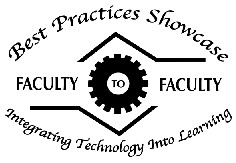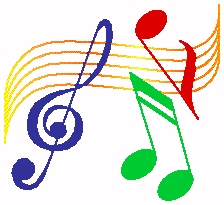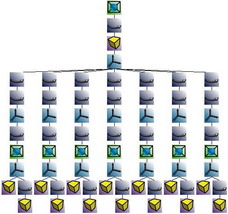Social Computing at the NJEDge.Net Best Practices Showcase
 I have been posting items on this blog and on one of my NJIT wikis.
I have been posting items on this blog and on one of my NJIT wikis. There's a lot more here than I can get to during the session, but it's a great way to exchange information and links AND if participants check back after today, the information will be updated and expanded.
As a small experiment in social computing, I asked NJEDge to pass on the link to this blog and the
wiki to see if participants would visit the site BEFORE today and start a conversation.
My session abstract reads: "The New Media Consortium's Emerging Technologies Initiative 2006 report on expanding the boundaries of teaching, learning and creative expression puts "social computing" and "personal broadcasting" at the top of their trends. Social computing, using websites such as MySpace, Facebook, and wikis, and personal broadcasting methods, such as podcasting and video blogging, is growing in use at a rapid pace with our students - and educators are being left behind. This session will give an overview of these trends with examples from students and faculty, and then focus on NJIT's current work using free and open-source wiki and blogging software to create non-commercial online collaborative spaces for academic use."
I'm talking about a number of web applications, open source software, and downloadable tools. I see these collaborative tools as very useful for asynchronous teaching/learning, for distance learning via internet, face-to-face support and hybrid courses and training. [Yes, this is AKA "Web 2.0" - that's "web 2-point-0" - see my earlier entry on that topic.]
According to a survey by the Pew Internet and American Life Study, 50% of teens have created content for the web; 20% have a blog or have posted to one (for girls 15-17, it's 39% and for boys 12-14 it's 32%) When queried about what they have personally shared online, the most common responses were: photos, diary-type entries, artwork, stories, poems, links, schoolwork.
Some social computing sites and tools:

Some wikis will allow completely unrestricted access so that people are able to contribute to the site without necessarily having to undergo a process of 'registration', as had usually been required by various other types of interactive websites such as Internet forums or chat sites.
Check out this wiki at NJIT that I'm developing for our division to use in working with corporations and government agencies to develop their own wikis for collaboration. This is a PUBLIC wiki (like wikipedia). It was built using open source software (Mediawiki, the same code used for Wikipedia). We also built a private wiki for the same project that is hosted off campus using PBwiki software. You can't get in to edit, but the site is at http://division35.pbwiki.com/ if you want to take a look & get info on how to get your own from them.
 In music, you can build your own "radio station" using Pandora by selecting artists and songs, and their software will begin adding/suggesting new music for you. Their software goes beyond the suggest a book/suggest a movie models used by Amazon.com and Netflix - they call their algorithm the Music Genome Project. You can share your music (station) with friends or just listen to stations that others are sharing. I created an eclectic Ronk Radio station and a second jazzy station for testing.
In music, you can build your own "radio station" using Pandora by selecting artists and songs, and their software will begin adding/suggesting new music for you. Their software goes beyond the suggest a book/suggest a movie models used by Amazon.com and Netflix - they call their algorithm the Music Genome Project. You can share your music (station) with friends or just listen to stations that others are sharing. I created an eclectic Ronk Radio station and a second jazzy station for testing.
 An easy way to edit images online if you don't have software available (or don't know PhotoShop et al) is to use PXN8.com. It allows you to do basic image editing online without having to download any software.
An easy way to edit images online if you don't have software available (or don't know PhotoShop et al) is to use PXN8.com. It allows you to do basic image editing online without having to download any software.  You can save your changes or directly upload them to Flickr which is a very popular photo sharing site.
You can save your changes or directly upload them to Flickr which is a very popular photo sharing site.
Protopage is a site that allows to to put up web pages on the fly. You can allow others to collaborate on the pages by giving them the login/password. Take a look at a Protopage that I did to demonstrate Protopage to some faculty at NJIT. http://www.protopage.com/teachnology
A number of sites are offering space online to create collaborative documents (not a web page). One of those is Writely and another is Writeboard. I set up a page on Writeboard for people in my group to work on a document about an upcoming seminar we are creating at NJIT. One nice feature of this is that it is not public - it requires a (shared) password for the group. Even though we share one password, the site allows us to tag our edits with our names so that we can see who did what.
Writeboard is part of a group of tools from an interesting company called 37signals.com. They also offer free (and premium for $ versions) tools. They have BaseCamp, There's a pretty robust collaboration site that combines several of their tools called Backpack (Watch a 3 minute video (not mine) about using backpack at http://backpackit.com/example_movies/BackpackG4TV-small.mov) There's a really easy to use online "to do" list for yourself or to share with a group named TaDa List.

With all the content out there, it was only a matter of time before we wouldn't be able to keep up on all the technology. It happened with Web 1.0 after a few years and that's when Yahoo and others stepped in to "index" the web and make finding things easier.
There are sites that allow you to bookmark what you like and allow others to share your recommendations and add their own comments or bookmarks. I've seen this called social bookmarking or linklogs.
del.icio.us ("keep your favorite websites, music, books, and more in a place where you can always find them. share your favorites with family, friends, and colleagues. discover new and interesting things by browsing popular & related items.")
digg ("Digg is a technology news website that combines social bookmarking, blogging, RSS, and non-hierarchical editorial control. With digg, users submit stories for review, but rather than allow an editor to decide which stories go on the homepage, the users do.")
Slide - shows you a visual stream of things you like but don't have time to search for. You can watch the slideshow or put it on any website or blog so others can watch.The slides can be breaking news about world events, business, sports and entertainment, things to buy, singles near you, updates from your favorite blogs, photos you love - Slide turns it all into a stream of pictures you can click on.
Comments
No comments